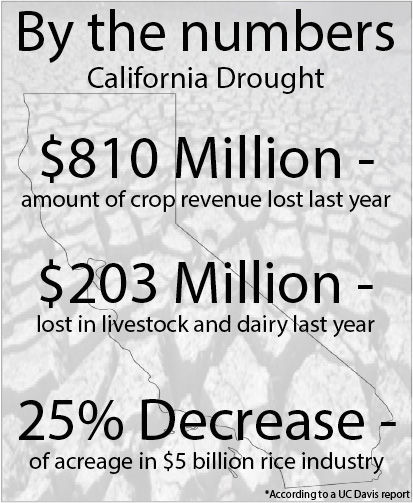California drought has yet to affect Iowa

Taylor Mankle/Iowa State Daily
California is currently in a state of emergency after suffering from a severe drought during the past four years. The drought is not expected to affect food prices in Iowa.
April 30, 2015
California has been in the middle of a severe drought for the past four years. The drought, caused by a lack of rain and snow fall, caused California Gov. Jerry Brown, to declare California to be in a state of emergency Jan. 17, 2014 and to restrict the water usage in California by 25 percent April 1.
Executive Order B-29-15 states, “The State Water Resources Control Board shall impose restrictions to achieve a statewide 25 percent reduction in potable urban water usage through February 28, 2016.”
On Tuesday, Brown proposed $10,000 fines for big water wasters. The new fine is a large increase from the current $500 maximum local water districts can impose on residents and businesses.
According to Extension, a research company, California has a $44 billion-agricultural industry, which produces 400 different crops, some of which cannot be grown anywhere else in the U.S.
“The Golden State produces almost all the tree nuts consumed in the U.S., 95 percent of the walnuts and 90 percent of the tomatoes. All told, California growers provide more than half the nation’s fruits and vegetables and almost all the tree nuts,” according to Extension.
California could witness a drop in its crop production because of the drought, causing some food prices to rise.
“The impact on the consumer could be very minor,” said Alejandro Plastina, assistant professor of economics.
Plastina said many of the fruits grown in California could be grown in Florida and the U.S. could start importing fruits and vegetables from Mexico, Peru or New Zealand.
The two products Plastina said consumers might see a price increase are grapes and almonds. This is because California’s climate is the best for growing these crops.
If the drought continues long term, some agricultural industries in California could begin moving to other states.
“Industries could migrate,” Plastina said. “Grapes and almonds won’t, but the cattle and calves could.”
The “migration” would take many years and require California to be in a severe drought for a long time because it costs a lot of money for an industry to move to a different state, Plastina said.
In the short term, Plastina said Iowans will not likely see an impact on food prices, but in the long run and if the drought continues, some food prices might start rising.
California is expected to witness more than $3 billion in losses to its farm economy, and an estimated 22,000 jobs will be cut this year, according to the Water Saving Coalition of Santa Cruz County.






